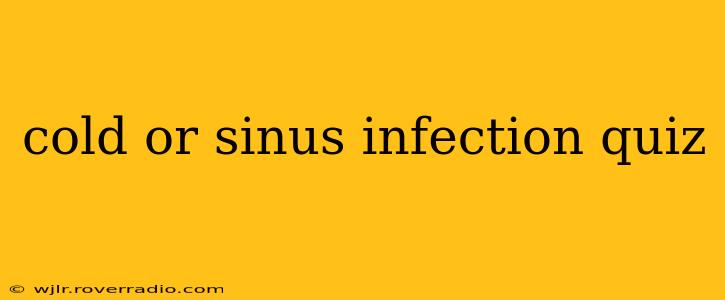Is it a cold, or is it a sinus infection? This common question plagues many, leading to unnecessary worry and potentially delayed treatment. While both share similar symptoms, understanding the key differences can help you seek appropriate care and alleviate your discomfort faster. This quiz won't replace a doctor's visit, but it can help you better understand your symptoms and prepare for a consultation.
Before we dive into the quiz, let's quickly differentiate between the two. A cold is typically a viral infection of the upper respiratory tract, causing mild to moderate symptoms that generally resolve within 7-10 days. A sinus infection (sinusitis), on the other hand, is an inflammation or infection of the sinuses, often bacterial or fungal, and can last much longer, sometimes requiring medical intervention.
Cold vs. Sinus Infection: Key Differences
While overlap exists, several key symptoms can help distinguish between the two:
- Cold: Primarily affects the nose and throat, with symptoms like runny nose (often clear), sneezing, sore throat, cough, and mild body aches.
- Sinus Infection: Often involves facial pain or pressure, especially around the cheeks, forehead, or between the eyes, along with thicker, discolored (yellow or green) nasal mucus, and potentially fever and fatigue.
Is it a Cold or Sinus Infection? Take This Quiz!
Answer the following questions to get a better idea of what might be ailing you:
1. How long have you been experiencing symptoms?
a) Less than a week b) 7-10 days c) More than 10 days
2. What is the color of your nasal mucus?
a) Clear or white b) Yellow or green c) No nasal mucus
3. Do you experience facial pain or pressure?
a) No b) Yes, mild c) Yes, severe
4. What other symptoms are you experiencing? (Select all that apply)
a) Sore throat b) Cough c) Fever d) Headache e) Body aches f) Fatigue
5. Do you feel generally unwell or fatigued?
a) No b) Mildly c) Severely
Interpreting Your Results
This isn't a definitive diagnosis, but a guide to help you understand your symptoms. After answering the questions, consider the following:
Mostly A's: You likely have a common cold. Rest, hydration, and over-the-counter medications can help alleviate symptoms.
Mostly B's: You may have a mild sinus infection or a cold that's lingering. Monitor your symptoms closely. If they worsen or persist beyond 10 days, consult a doctor.
Mostly C's: You likely have a more severe sinus infection or another underlying condition. Consult a doctor immediately.
Frequently Asked Questions (FAQs)
H2: How long does a cold usually last?
A typical cold will run its course in 7-10 days. However, some symptoms, such as a cough, might linger for a couple of weeks.
H2: How long does a sinus infection last?
Untreated sinus infections can last for weeks or even months. Treatment with antibiotics or other medications can significantly shorten the duration.
H2: What are the best home remedies for a cold or sinus infection?
Rest, hydration (plenty of fluids), and over-the-counter pain relievers such as ibuprofen or acetaminophen can help alleviate symptoms. Saline nasal sprays can also help to clear congestion. For sinus infections, a humidifier can help to loosen mucus. Always consult your doctor before starting any new medication.
H2: When should I see a doctor for a cold or sinus infection?
You should consult a doctor if:
- Your symptoms last longer than 10 days.
- Your symptoms worsen significantly.
- You develop a high fever.
- You experience severe facial pain or pressure.
- You have difficulty breathing.
H2: Can antibiotics cure a cold?
No. Antibiotics are ineffective against viral infections like the common cold. They are only effective against bacterial infections, such as some types of sinusitis.
Disclaimer: This quiz and information are for educational purposes only and should not be considered medical advice. Always consult with a healthcare professional for diagnosis and treatment of any medical condition. This information is not a substitute for professional medical advice.
